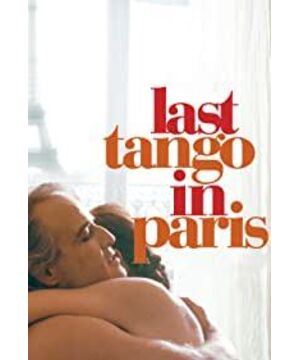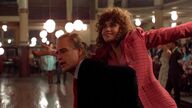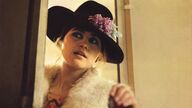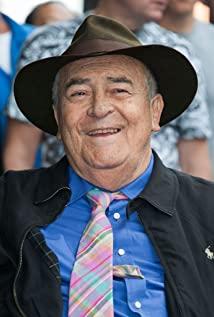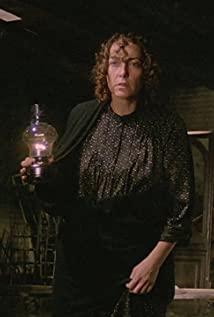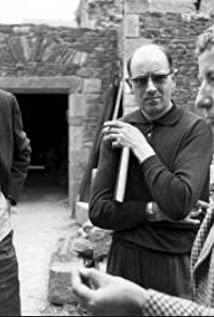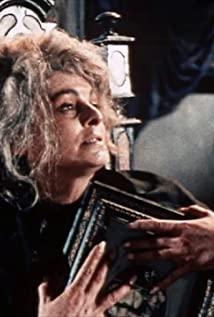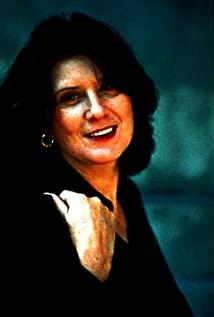There are indeed many mysteries that are difficult to explain. Except for vague guesses and intuitive feelings, we are only full of doubts. From the beginning of the film, we saw a middle-aged American man who suffered terribly from the death of his wife—Paul, on the street. She was crying, and above his head was a flyover rail tram whizzing past. At this time, the young Jeanna came from behind... In the following scene, a maid carefully scrubbed the blood from the scene of Paul’s wife’s suicide. While mumbling about the wandering experience of Paul’s life, Paul listened to her in silence across a wall. When she provocatively handed the suicide razor to Paul, Paul pushed the maid on. The posture seemed to kill her... the manager of the apartment, the black woman’s weird laugh... Paul’s mother-in-law came after hearing the news, and the conversation between the two of them was even more confusing. The camera shakes back and forth between them, seeming to imply that there is something secret between them, including Paul's rude attitude, mother-in-law's excessively low voice but full of doubts...and why did Paul's wife commit suicide? Why did Jeanne, a young Parisian girl, come to Paul's brutal and venting embrace again and again? What do the paintings by the American painter Francis Bacon suggest? These numerous mysterious expressions and scenes and inexplicable emotions, chaos, desolation, and eloquence, just like wandering eros, take place in this floating and tranced movie Paris.
After watching this movie many times, I gradually saw several clear spaces, but what happened in these spaces was still a little dark and unclear. The main space is the apartment where Jeanna and Paul met. Paul just wanted to escape the inescapable emotional abyss, the emotional fracture caused by the death of his wife, and the huge void caused by this fracture, physically. Emotionally. And Jeanna, probably just wanted to rent a temporary residence for her boyfriend to come from another place. She met this haggard and sad American in the apartment, because he refused to give his name, because of his expression and sturdy physique, and a sense of mystery. It was born spontaneously, but more importantly, this occasional and full of random scene provides the atmosphere for things to happen. This empty but inexplicable Paris apartment to be rented hides the expression of indifference and order in the city. Below, it was like a cave, a cave of erotic desire and escape, and Jeanna and Paul met in this accidental secret cave, as if there was a mysterious arrangement in the dark, so the phone rang suddenly They were answered by extension phones in two rooms, but only each other’s voices came from the other end of the phone, making Na hold the receiver like a nightmare and listen to Paul’s breathing, while Paul quietly put down the receiver and walked towards her. .
I think that in this space, the emotional orientation of the two is still clear. Paul clearly wants to escape. He wants to bury himself in endless and crazy desires to vent. Moreover, he only needs accident, so he never needs a name. Don’t accidentally be anything other than eros, and Jeanna is fascinated by the mystery that Paul brings. In this apartment with only a big bed for sex, she has felt scared countless times and her desires are satisfied. After the emptiness, and the humiliation brought by Paul's attitude, but she still can't help but come back here, undressing obediently, this extremely contradictory thing is like desire itself, which is scary and fascinating. The anal sex scene that later made director Bertolucci notorious was indeed shocking. These private and extreme things made this apartment even more depressing, and also made us understand Paul’s tough and rough surface but actually fragile and lonely at heart, and Jeanna Her method of revenge was a little prank: She tricked Paul into helping her play with the record player, and Paul was hit hard by the electricity leaking from the plug.
A conversation between Paul and Jeanna is very important. After Jeanna came to the apartment to find Paul in the rain in a wedding dress, Paul showered her like a little daughter. Jeanna said that she had found a mysterious, tall and strong lover. Paul said:
Do you need someone to take care of you and protect you?
Yes.
You need great warriors to build fortresses for you to hide in, so that you don’t feel scared, lonely, and empty.
Yes.
...You can't find such a person, you will never find it.
No, I found it.
Soon, he will need you to help him build a fortress, from your chest, smile, hair and taste, a place that makes him feel safe and comfortable.
But I found it.
No, you are alone, you are always alone, you can't escape the feeling of loneliness until you die...
listen carefully! From this conversation, we can glimpse the secret of Paul’s heart, and the other space it brings about is the small hotel run by Paul and his wife (we should also vaguely think about the cause of Paul’s wife’s death), I guess that The hotel in Paris is like a fable. Paul once said in front of his wife’s body: "I turned off the lights last night and all your guests ran out. I am also one of these guests, right?" This guest- -The place where the owner is constantly flowing is Paul's home and a hotel in the city. Behind the frosted glass on the windows, there are wandering travelers from all over the world, and Paul is also one of these travelers, just by accident The chance stayed, but he never knew his wife. It seemed impossible to understand. He didn't even know why she committed suicide. This kind of complete alienation has been reflected in every corner of the hotel space through Paul's eyes many times.
The film reveals the ubiquitous drifting flu in the city, in the American with complicated experience, in the space of the hotel, among the pedestrians of various skin colors on the street.
Jeanna and his fiancé Tom are in another space, mostly outdoors. In comparison, they are relatively normal. Even Tom’s neurotic behavior at certain times is also the normal behavior of "artistic youth" in this age group. It is a kind of slightly performance nature, fear of being noticed and fear of other people's behavior and speech style caused by the psychology of others not paying attention. This kind of serious but neurotic energy makes the feelings between Tom and Jeanna not easy to deepen. And the filming team that came with Tom is like a set of ubiquitous peeping eyes (this is one of the reasons that makes Tom excited, and he himself is precisely the poor and passionate director of this peeping love scene) , Staring at the young couple, watching them perform love outdoors, under Tom’s "guide", Jeanna took the filming team to shoot in the old house in the country. The childhood memories she told in the old house are also full In addition to performance, (this is in contrast to the conversation between Jeanna and Paul in the apartment in the next scene. Compared with Tom, Paul is more willing to penetrate the inside of things, and he presses on Jeanna's more secret memories— The first sexual sprouting and the growth experience related to it)
Jeanna's relationship with Tom alludes to a real world full of order but cold and boring. When Jeanna wants to fly, Tom wants her to "be serious like an adult." ", so Jeanna escaped from Tom again and again, came to Paul’s Eros Cave, in the subway, when Jeanna wanted to break through the net of reality for the first time and said loudly to the opposite Tom, "I want to leave you "When the huge steel machine, the subway, was speeding past, Jeanna's confession was left with silent shouts. Then Tom suddenly appeared in front of the frustrated Jeanne. The two were fighting with each other like boxers. These conceptual scenes. Both are the reasons that make the film a fascinating riddle.
"Boxing" or "Tango" is like the two sides of a thing. It is used as a metaphor for love. It can indeed reflect the mutual torture, fighting and interdependence between the two sexes. The relationship that accompanies each other is fierce like boxing and ritualized like tango. In these conceptual vocabulary, does love necessarily have a tragic ending? In the film, Jeanna and Tom prepare to get married, try on clothes in the bridal shop, surrounded by busy shop assistants, and a shooting team that is always in the shadows. Jeanna and Tom’s "popular wedding" are previewed in front of everyone, and Tom is excited. Muttering to himself, praising the beauty of his fiancee and the purity of love, he even went out and stood in the rain exaggeratedly and told his inner passion. He was intoxicated in his passion, and Jeanna had already ran to Paul and told Paul her fascination and love for him.
Paul, who had been indulging in the pain and confusion caused by his wife’s suicide, seemed to be resurrected after death. After this meeting, he moved out of the apartment, which made Jeanna extremely sad, and even Tom, who didn’t know it, could hear this. People go to the "smell of sorrow" in the empty apartment. In the last scene of the film, (corresponding to the first scene), Jeanna walks on the street, and Paul, who has been reborn, catches up with her from behind, but Jeanna says, "Everything is over."
Paul Insisting that everything just started, the two were talking in a tango dance hall, Paul told Jeanna of his identity, the mystery was eliminated, "Mr. Inn"
"This is bad enough, but what is the difference between house, hotel, castle, etc." , I love you enough.” In the
tango dance hall, a grand tango competition is coming to an end. A funny old woman judge with eyes announced: Bless the last tango! And Jeanna and Paul also walked into the dance hall. Paul said to Jeanna: "If music is the food of love, then please keep playing!" Two drunk people are like two in front of a serious dancer. A silly child, the old woman hurriedly interfered, Paul announced to her: "This is love!"
"But this is a game, not suitable for love, go to the cinema to watch love."
Paul was pulled out of the dance floor, but he took off Pants, protesting with her ass. At this time, Jeanna was completely afraid of Paul, and she escaped again, but Paul chased her with a playful smile on her face, making Na more and more afraid, and she ran back When he got home, Paul chased him in. He did not see that she was already holding the pistol in her hand. In Paul’s passionate show of love, Jeanna pulled the trigger. After Paul was hit, he walked to the balcony, as if a word Did not finish: "Our child...", facing the empty and crowded city view of Paris, he said blankly: "Mom!" He fell to the ground, and Paul died on the balcony, curled up, as if Back to the mother body.
I think an implicit theme of this movie is the love of the wandering Paul, which is the emotional and physical experience of his wandering mind without support. The director Bertolucci, an Italian, always shoots. When shooting films about foreigners and people in foreign countries, I am also very obsessed with the atmosphere in his films, the colors and tunes "other places", including his grasp and presentation of the art, politics, music, and cultural background of that period. I It seems to be able to penetrate the fog of time and space, and experience the kind of drifting empathically. Hemingway, Stein, Joyce, Picasso, Paris Left Bank, New Wave movies, that noisy Paris, the warm yellow light from the frosted glass makes people feel warm for a moment, but can exacerbate the cold in the drift, in the film Jeanna once asked Paul why he didn’t return to the United States. Paul said vaguely: "I think it’s some bad memory." In Paul’s recounting, we see the childhood of this strong man. In fact, it’s us. Being able to experience childhood is completely opposite to the Parisian Jeanne's butter cake-like childhood. Paul is actually a child. He has always been in the regret of the lack of childhood love. This regret makes him look for loss like a fate. love, as he said to Jeanne: "soon after, he needs you to help him build the fortress, built up from your chest, smile, hair and taste, a let him feel safe and comfortable place."
that The fortress is a woman, it is love.
This is definitely not a simple projection of Bertolucci’s own feelings. I don’t even want to say that this is the self in the mirror I watched... As a movie, "Paris, The Last Tango" has long become a classic, and it is very well shot. Beauty, exquisite composition, color, and the appropriate jazz music that always swirls and vigorously make every scene and lens of it become an evocative poem, not only a poem of images, but also a poem of atmosphere and emotion. It has a kind of belt. People leave reality and walk into the magic of time.
View more about Last Tango in Paris reviews


